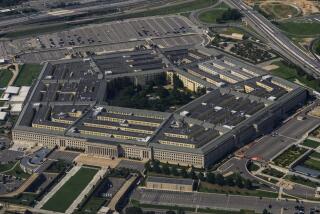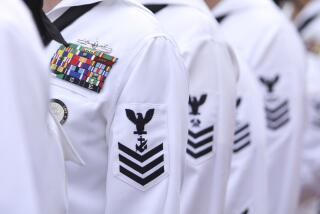Elite Military Forces to Get a Major Test
- Share via
The Bush administration, confronted with a stealthy enemy in unforgiving terrain, is embarking on the biggest mobilization of the military’s elite special operations units since the Vietnam War, experts say.
If successful, the use of these soldiers--highly trained in sabotage, kidnapping and guerrilla warfare--could significantly bolster the role of special operations in future U.S. military strategy, some experts add.
“This is the biggest test of special operations since Vietnam,” said John Pike, director of GlobalSecurity.org, a defense policy organization. “This mission isn’t just about capturing one guy. It’s a long campaign with thousands of combatants.”
The role of special operations--which include the Green Berets, Navy SEALs and Air Commandos--in the new war on terrorism has so far been uncharacteristically high-profile, particularly because the military doesn’t even officially acknowledge the existence of some units, such as the counter-terrorist Delta Force.
Last week, military officials announced that special operations would play a key role in defeating Osama bin Laden and other terrorists. “These are people who operate in the shadows and we have to deal with them in the shadows,” said Defense Secretary Donald H. Rumsfeld.
A spokeswoman for the special operations command at Ft. Bragg, N.C., confirmed that the unit received a deployment order, but would not say how many of its 46,000 active and reserve troops were being called into action.
In any given week, experts estimate, about 3,000 special operations soldiers are deployed on 150 missions in 70 countries, conducting covert operations, training foreign soldiers and forging ties with various factions. The $4-billion annual budget for special operations represents less than 2% of Defense Department spending.
Most Missions Never Revealed
Officials have stressed that the war on terrorism will be much larger and longer than the quick in-and-out missions that have characterized special operations in recent years, such as the 1989 capture of Panamanian leader Manuel Noriega.
Special operations units played only a minimal role in the Gulf War, tracking down Scud missiles and putting laser targets on enemy equipment so laser bombs could destroy them.
Because of their covert nature, most missions are never revealed. There is speculation that special operations took part in the 1993 assassination of Colombian drug lord Pablo Escobar.
“The failures are more likely to become known than the successes,” said retired Col. Daniel M. Smith, a former Army intelligence officer in Vietnam who heads research at the Washington-based Center for Defense Intelligence, a nonprofit think tank.
High-profile flops have included the aborted Delta Force attempt during the Carter administration to rescue the hostages in Iran, and the Delta Force and Army Rangers’ failed kidnapping of Somali warlord Mohammed Farrah Aidid, in which 18 U.S. soldiers were killed.
Military experts say the Sept. 11 terrorist attacks were a reminder that the nation faces unconventional threats that cannot always be addressed with conventional forces or airstrikes from afar.
“Sometimes a scalpel works better than a sledgehammer,” said Andy Messing Jr., who spent 17 years in Army Special Forces before founding the National Defense Council Foundation, a right-leaning think tank.
Terrorizing the terrorists will be a top aim of the special operations forces, many of whom are probably already working underground in Afghanistan and surrounding countries to destabilize and demoralize Bin Laden’s followers, outside experts have speculated.
‘The Perfect War for Special Operations’
It’s familiar turf. Special operations forces have worked in both Pakistan and Afghanistan, assisting rebels--possibly including Bin Laden--during the Soviet invasion in the 1980s.
Locating and capturing Bin Laden himself will probably fall to the prestigious Delta Force, which specializes in daring hostage rescues and kidnappings, said Pike of GlobalSecurity.org.
Army Rangers would prove useful in attacking and destroying Bin Laden’s desert training camps and other targets, while Green Berets will probably provide assistance and training to local rebels, such as the Northern Alliance.
Air Force Air Commandos specialize in reconnaissance flights and will be key to evacuating other units in difficulty or after missions are completed.
Psychological warfare and propaganda is another focus of special operations. During the Gulf War, special operations smuggled printing presses into Kuwait to assist rebels, and in Panama, Rangers tried to prevent Noriega from sleeping by blaring heavy metal rock music at the Vatican Embassy, where he took refuge.
“This is the perfect war for special operations,” said Carlos Moleda, a former Navy SEAL who participated in the Noriega mission. “This is going to be more like a cat-and-mouse game. And special operations are great hunters.”
Training for the command is legendary. More than 70% of volunteers fail. Recruits learn to survive for weeks in hostile environments, eating bugs and rodents to survive. They scale oil rigs carrying 100 pounds of gear, parachute from 30,000 feet and learn to operate without sleep for up to a week.
Various Units Operate Under Single Command
Members of these units have skills ranging from foreign languages to bomb-building to hot-wiring trucks.
“Even in training we use real bullets and real bombs,” said Moleda, who was shot in the back during the Noriega raid and was paralyzed from the waist down.
Even within the military, the loyalty and commitment in special operations is unparalleled, former members say. “It has the highest divorce rate in the military,” Messing said. “That speaks volumes.”
Moleda said he has one thought as he watches preparations for military action: “I would hope for a miracle so I could stand up and walk and go back in.”
Though covert operations date back to the American Revolution, modern-day special operations began to emerge in the 1960s under President John F. Kennedy. Today the various units operate under a single command, based at MacDill Air Force Base in Florida. Much of the training still occurs at John F. Kennedy Special Warfare Center and School at Ft. Bragg.
Smith, the former Army intelligence officer, predicted that the importance of such units will continue to increase.
“I wouldn’t be surprised when this is over that there will be more interest in the special operations community,” he said. “We are forecasting a continuing decline in the kinds of conventional encounters we saw in the Gulf War and more along the lines of [the current action] or Vietnam.”
Some Friction With Mainstream Military
A larger role for special operations could stir controversy within the ranks, according to some experts. Though special operations relies heavily on conventional forces and intelligence agencies, there has historically been friction between the mainstream military, which receives the bulk of the money, and special operations, which enjoys an elite status.
Still, a higher profile is something such units are unaccustomed to.
“Special operations is known as the quiet professionals,” Messing said. “They are not the chest-beaters. But they are a heroic bunch.”
More to Read
Sign up for Essential California
The most important California stories and recommendations in your inbox every morning.
You may occasionally receive promotional content from the Los Angeles Times.













